|
|
|
Sort Order |
|
|
|
Items / Page
|
|
|
|
|
|
|
| Srl | Item |
| 1 |
ID:
131122
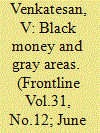

|
|
|
|
|
| Publication |
2014.
|
| Summary/Abstract |
The decision to constitute a special investigation team to investigate cases of black money stashed away in foreign banks will prove to be an acid test for the Narendra Modi government as the fight against the black economy, calls for the strong political will.
|
|
|
|
|
|
|
|
|
|
|
|
|
|
|
|
| 2 |
ID:
132515
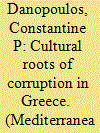

|
|
|
|
|
| Publication |
2014.
|
| Summary/Abstract |
Despite periods of growth, modern Greece is no stranger to severe and prolonged economic crises. Analyses of Greece's current economic crisis have stayed clear of the seminal importance of culture as a key variable responsible for widespread and persistent corruption that has deprived the country of a viable and sound economic foundation. This essay seeks to fill the void by concentrating of the cultural roots of corruption and the sources and factors that generate, nurture, and maintain high levels of corruption in the Greek setting. Borrowing from anthropological literature, the essay utilizes nine cultural dimensions of corruption: uncertainty avoidance, future orientation, institutional/societal collectivism, individual/in-group collectivism, human orientation, performance orientation, power distance, assertiveness, and gender egalitarianism.
|
|
|
|
|
|
|
|
|
|
|
|
|
|
|
|
| 3 |
ID:
131063
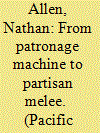

|
|
|
|
|
| Publication |
2014.
|
| Summary/Abstract |
The party system in Indonesia has expanded in the post-Suharto era. With each successive election, voters have spread their support across a wider array of parties. This has occurred despite deliberate institutional tweaks designed to consolidate the system by privileging large parties. Why has the party system expanded despite increasing institutional incentives to consolidate? This article places party system change in a broader context of decentralization and corruption. The decentralization and deconcentration of political power has opened multiple avenues for voters and elites to access state resources. Whereas major parties were expected to dominate resources in the immediate aftermath of the transition, changes to the formal and informal institutions eroded their control over the state. This has caused previously consolidated subnational party systems to fracture. The argument is demonstrated using narrative and newly constructed cross-district datasets. The paper develops the concept of rent opportunities, defined as the ability to access and abuse state resources. Party system expansion has been greatest in areas with high rent opportunities, where both voters and elites are Social Media Presidential Election Indonesia 2014 Indonesiaparticularly motivated by the competition for state resources. In these areas, characterized by large state sectors, the formerly authoritarian party (Golkar) initially won large electoral victories due, in part, to its control over patronage. As Golkar lost its ability to monopolize resources, the party system fractured. Voting for small parties surged and the party machine was replaced by a partisan melee. My argument exposes the limits of institutional engineering and underlines the formative role corruption has had on the evolution of Indonesia's party system.
|
|
|
|
|
|
|
|
|
|
|
|
|
|
|
|
| 4 |
ID:
139266
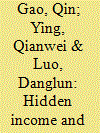

|
|
|
|
|
| Summary/Abstract |
Using a unique dataset based on a survey conducted by the Guangzhou Land Resources and Housing Administrative Bureau from November 2009 to January 2010, this article examines the sources and distribution of the hidden income of residents from different occupational backgrounds, taking into consideration their explicit income and other socio-economic characteristics. The results show that government officials not only had the highest but also the most stable hidden income, followed by employees in state-owned enterprises and employees in colleges or research institutions. Among government officials, those holding higher-level positions possessed more hidden income than those in lower-level positions. These findings have implications for China's labour market, taxation and resource allocation, and need to be taken into consideration in future economic and political policy designs and implementations.
|
|
|
|
|
|
|
|
|
|
|
|
|
|
|
|
| 5 |
ID:
130184
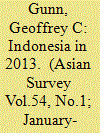

|
|
|
|
|
| Publication |
2014.
|
| Summary/Abstract |
Ahead of upcoming elections, expectations ran high in 2013 across the archipelago for a highly pluralistic electorate. With China as a leading trading partner, the backdrop for Indonesia was steady economic growth, albeit checked by a sliding currency, a current account deficit, and a depressing culture of corruption. Mixing commerce and geopolitics, China, the U.S., and Japan all turned to Indonesia to expand their influence.
|
|
|
|
|
|
|
|
|
|
|
|
|
|
|
|
| 6 |
ID:
131010
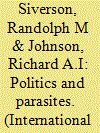

|
|
|
|
|
| Publication |
2014.
|
| Summary/Abstract |
We address the consequences of corruption within a state on the extent to which populations have shortened life expectancy due to political corruption. Using three variables to estimate corruption, the results support the expectation that corruption increases average disability shortened life years (DALY). The results persist when estimating the model including measures of deaths from civil war and the number of bordering states experiencing civil war, both previously shown to have an effect on DALY, although these two variables are not statistically significant in our models. While the estimated effects of the corruption variables continue to capture much of the variation in DALY for a global group of nations, they completely fail to explain any variation in Sub-Saharan African states, probably because of the devastating effects of AIDS and malaria in that region. Finally, we discuss why this failure occurs and discuss the implications of our results.
|
|
|
|
|
|
|
|
|
|
|
|
|
|
|
|
| 7 |
ID:
131125
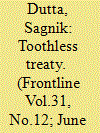

|
|
|
|
|
| Publication |
2014.
|
| Summary/Abstract |
A new OECD declaration paves the way for access to information on bank accounts in tax havens like Switzerland, but is still skewed in favour of such tax havens.
|
|
|
|
|
|
|
|
|
|
|
|
|
|
|
|
| 8 |
ID:
131123
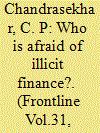

|
|
|
|
|
| Publication |
2014.
|
| Summary/Abstract |
Illicit capital outflow has increased significantly after neoliberal policies were introduced in 1991. Committed as it is to the same economic model, can the NDA government curb generation of black wealth and bring back the black money stashed abroad?
|
|
|
|
|
|
|
|
|
|
|
|
|
|
|
|
|
|
|
|
|